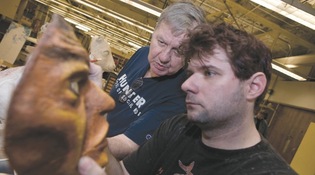 loading
loading
featuresBy handTheater today thrives on the high-tech and large-scale. But in Hunter Spence's classes, students still learn small-scale artistry and old-fashioned cuss words.  Julie BrownMask-making is one of the crafts Hunter Spence (here, giving pointers to student Larry Lehew ’10MFA) teaches his students. View full image"The eye is a like a dewdrop," Hunter Spence tells Dace Micane Zalite. "Light reflects against the top of the dewdrop, and that's where you get the glare." He asks her to look into his eyes. The light that does enter the eye, he shows her, brightens the lower iris, but without glare. Zalite dips her brush in white paint and starts experimenting on the wolf mask she's making. Spence's seven students are clustered at one end of the Yale School of Drama's cavernous paint shop, shaping features in clay -- wide eyes and a wrinkled forehead for an anguished mask, a hooked nose for a half mask in commedia dell'arte style. Spence has students build their masks on plaster casts of their faces, and a dozen white casts with closed eyes, left behind by former students, hang on the wall near the worktables. A cast of Spence's own face hangs there too. Next to a latex mask of a crone with matted gray hair, a crown of thorns has been slung casually over the corner of a shelf; it's made of dried grapevines studded with gilded wooden golf tees. An open box of fake chocolates is pinned to the wall. Mostly, Spence watches his class silently. From time to time, he shuffles over to a student, leading with the left side of his body and pulling along his right leg, which never recovered after his second stroke. "Sharpen that angle," he says, or "The lips need work." He's dressed in his usual khakis, with a T-shirt that reads, "Hunter School of Social Work." The students talk theater as they work. But when the conversation gets too lively, Spence moves in close to one student or another, and says: "Shut the fuck up and get to work." "I'm a little fussy as a teacher," he announces to nobody in particular. He pauses, then adds: "Maybe I'm a five-star rat bastard. I want it the way I want it. When you get out of here, you can do any damn thing you want. But if you're with me, you do it my way." No one seems to mind. Spence, 74, manages to render phrases like "Shut the fuck up" as terms of endearment. Maybe it's the soft contours of his Virginia accent. Maybe it's the disarming irony of aggression from a man whose body is frail. Whatever the case, his down-home pose and sailor's tongue serve as a kind of card trick. The eye and ear are diverted, and suddenly Spence is showing his ace: a dead-serious insistence on doing things right, fine-tuning work that looks good to the ordinary eye. "Getting someone to learn something, sometimes you have to push," he says. If that makes him a five-star rat bastard, he's fine with that. Roughly 60 students enter the drama school every year, 10 of them to study technical design and production. "Most TD&P coursework is practical," says Neal Mulligan ’01MFA. "We have classes on understanding hydraulics and pneumatics. We have classes on how to analyze structures." TD&P students study Newtonian mechanics, control systems for mechanized scenery, and the National Electrical Code. Among the faculty members are an author of reference books on stage rigging and engineering stage machinery and a former sound engineer for the Metropolitan Opera House. But from Spence, TD&P students learn small-scale, old-fashioned artisanship -- the design and construction of theater props. Along with mask-making, he teaches basketry, upholstery, casting, scene painting, and floral design. "Spence is constantly bringing it back to the aesthetic," says Mulligan. "He gets the practical side of things. But he's an artist." Maybe too much so, sometimes. Drama school properties craftsman David Schrader recalls that in 1988, when he took over Spence's job making props for the Rep -- Spence remained properties master -- he "sat across from me watching my every movement, and he'd glower at me and harrumph and make little disgusted noises. He was pretty blunt about it: 'You young guys come in thinking you know all about props, but you don't know dogshit.'" Schrader told Spence off. "Talk to me like an adult," he demanded. From then on, they were good friends. "He's very particular," Schrader says, "and he'll dog you until he feels you've lived up to your fullest potential. If he thinks you're not going to, he needs to let you know. He's a big pain in the ass. But I would do anything for him."
|
|